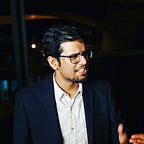The changing definitions of the self
The concept of the self is a very interesting one.
On the outset, it seems like the easiest thing to define — what is the self but who you are: the sum of all your experiences and assets, including your body and mind? It’s a fair definition of an entity as a collection, or a list of other entities. It’s like defining what a dog is — it’s a collection of organisms with a genetic code that follows certain constraints. Okay, I know that’s not exactly the same because one collection is finite and the other may not be, but for the sake of this discussion, let’s treat a finite and an infinite list just as a list. It’s a mathematically sound definition, as long as you can define what the constituting entities are. In the case of the self, experiences and assets are generally well understood and easy to define (more on that later).
But is that all? I’m sitting on the grass facing one of my close friends from Stanford, and she just described the city that we are in as being a nostalgic place for her, reminding her of her childhood. Such an association is a very common one, and anything that makes you feel nostalgic must surely be an integral part of the self, right? By the definition of nostalgia, you only feel that way for things that you associate yourself with. So maybe, it’s not just one’s experiences that constitute the self, but also the relationships between those experiences that translate into specific entities outside of the self being heavily interlinked with the self. Take close friends for example — they are clearly not part of the self, but the relationship between your tenth birthday party at the movie theatre and a night of boundless gossip about your school teachers in eleventh grade might be that one friend who was with you on both of those occasions and who made them worth remembering and those places worth feeling nostalgic about. Then that friend, in those experiences and in the relationships between them, is also a part of your identity just as much as that cell in the adipose tissue inside the wall of your small intestine. This is how you define an entity as a collection of entities and relationships between them — as graphs essentially. This is basically how you’d define a community, right? The set of people and the relationships between them? So the self would then be a graph with experiences and assets as vertices and the relationships between them (people, places) as edges.
But is that all there is to the concept of the self? I tend to believe that these definitions are still at the surface level or just a couple levels deeper, but not more than that. What gets deeper is — how does the self perceive and regulate the self? What are the set of principles that govern the self, biological, social and self-imposed? When you promise yourself that you’d rather be trustworthy than paranoid with anyone you start working with, that’s a principle of the self, and not an experience or a relationship. These principles provide a moral compass of sorts, but also a way to lead our lives, and might be important in providing meaning and purpose to our lives. They dictate a part of all the future experiences, and thus directly affect the evolution of the self. It’s the self interacting with itself to establish things that are even more fundamental than experiences, and probably stickier than assets (a principle might stand the test of time, but your body might deteriorate).
So the self is not just a temporal graph but also a set of rules that govern the evolution of that graph over time. These rules involve the current state of the self (like what occupies the mind and what habits and commitments one has) as well as the principles that the self adheres to (like priorities and a code of ethics). Is that all there is to it?
I don’t know — I am limited by the capacity of the self to ponder about the self.
